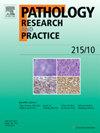参与调节代谢、炎症和凝血的基因变异对 COVID-19 相关心脏损伤发病机制的影响。
IF 2.9
4区 医学
Q2 PATHOLOGY
引用次数: 0
摘要
背景:SARS-CoV-2感染可导致急性期过后的长期慢性心血管(CV)损害。COVID-19 经常引起活动性心肌炎,SARS-CoV-2 可直接感染并杀死心脏细胞,导致器官和细胞的严重病变和功能障碍。迄今为止,COVID-19 相关性心脏损伤的发病机理尚不清楚,但有多种因素导致心脏损伤的进展,如遗传、饮食和环境等。其中包括代谢、炎症和凝血相关基因在内的一系列宿主遗传因子在 COVID-19 诱发的心脏损伤中扮演了重要角色。遗传性 DNA 序列变异几乎会导致所有这些疾病的患病风险。因此,我们研究了一般人群中代谢、炎症和凝血相关基因的遗传变异发生情况、它们在各种疾病中的表达以及它们对 COVID-19 诱发的心脏损伤的影响:方法:我们利用 PubMed(Medline)、EMBASE 和 Google Scholar 等多个数据库进行文献检索:参与代谢(APOE、MTHFR)、凝血(PAI-1、ACE2)和免疫因子(CRP、ESR和肌钙蛋白I)的基因可能在COVID-19相关心脏损伤的进展中发挥作用。心血管疾病的危险因素在不同地区之间和不同地区内部存在显著差异。在健康人中,ACE I 等位基因负责诱发 CAD,但 ACE D 单倍型负责易感性和严重性,最终导致心力衰竭。携带 TMPRSS2 基因中 rs12329760 的 T 等位基因的患者有患严重型 COVID-19 的风险。IL-6(rs1800796/rs1800795)多态性与死亡率升高和重症 COVID-19 易感性有关。IL-6对心脑血管疾病等慢性炎症性疾病的潜在作用已众所周知:结论:ACE-2、AGT、DPP-IV、TMPRSS2、FUIRN、IL-4、IL-6、IFN-γ 和 CYP2D6 基因的遗传变异在不同人群中存在差异。研究这些变异及其蛋白水平与 COVID-19 诱发的心脏损伤之间的相关性可能会对 COVID-19 诱发的心脏损伤的发病机制提供有价值的见解。本文章由计算机程序翻译,如有差异,请以英文原文为准。
Impact of genetic variations of gene involved in regulation of metabolism, inflammation and coagulation on pathogenesis of cardiac injuries associated with COVID-19
Background
SARS-CoV-2 infection can result in long-term chronic cardiovascular (CV) damage after the acute phase of the illness. COVID-19 frequently causes active myocarditis, SARS-CoV-2 can directly infect and kill cardiac cells, causing severe pathology and dysfunction across the organs and cells. Till now, the pathogenesis of COVID-19-associated cardiac injuries has not been understood, but there are several factors that contribute to the progression of cardiac injuries, such as genetic, dietary, and environmental. Among them ranges of host genetic factor including metabolizing, inflammation, and coagulation related genes have a role to contribute the cardiac injuries induced by COVID-19. Hereditary DNA sequence variations contribute to the risk of illness in almost all of these diseases. Hence, we comprehended the occurrence of genetic variations of metabolizing, inflammation and coagulation-related genes in the general population, their expression in various diseases, and their impact on cardiac injuries induced by COVID-19.
Method
We utilized multiple databases, including PubMed (Medline), EMBASE, and Google Scholar, for literature searches.
Description
The genes involved in metabolism (APOE, MTHFR), coagulation (PAI-1, ACE2), and immune factors (CRP, ESR, and troponin I) may have a role in the progression of COVID-19-associated cardiac injuries. The risk factors for CVD are significantly varied between and within different regions. In healthy individuals, the ACE I allele is responsible for the predisposition to CAD, but the ACE D haplotype is responsible for susceptibility and severity, which ultimately leads to heart failure. Patients who carry the T allele of rs12329760 in the TMPRSS2 gene are at risk for developing the severe form of COVID-19. IL-6 (rs1800796/rs1800795) polymorphism is associated with an increased mortality rate and susceptibility to severe COVID-19 disease. While the putative role of IL-6 associated with chronic, inflammatory diseases like cardiac and cerebrovascular disease is well known.
Conclusion
The occurrence of genetic variations in the ACE-2, AGT, DPP-IV, TMPRSS2, FUIRN, IL-4, IL-6, IFN-γ, and CYP2D6 genes is varied among different populations. Examining the correlation between these variations and their protein levels and cardiac injuries induced by COVID-19 may provide valuable insights into the pathogenesis of cardiac injuries induced by COVID-19.
求助全文
通过发布文献求助,成功后即可免费获取论文全文。
去求助
来源期刊
CiteScore
5.00
自引率
3.60%
发文量
405
审稿时长
24 days
期刊介绍:
Pathology, Research and Practice provides accessible coverage of the most recent developments across the entire field of pathology: Reviews focus on recent progress in pathology, while Comments look at interesting current problems and at hypotheses for future developments in pathology. Original Papers present novel findings on all aspects of general, anatomic and molecular pathology. Rapid Communications inform readers on preliminary findings that may be relevant for further studies and need to be communicated quickly. Teaching Cases look at new aspects or special diagnostic problems of diseases and at case reports relevant for the pathologist''s practice.

 求助内容:
求助内容: 应助结果提醒方式:
应助结果提醒方式:


